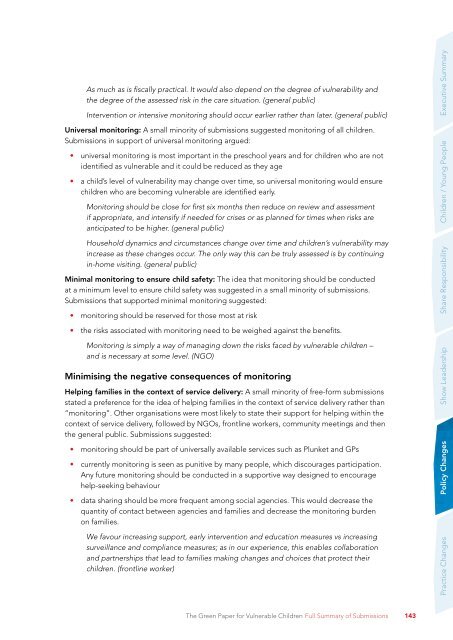The Green Paper for Vulnerable Children - Ministry of Social ...
The Green Paper for Vulnerable Children - Ministry of Social ...
The Green Paper for Vulnerable Children - Ministry of Social ...
Create successful ePaper yourself
Turn your PDF publications into a flip-book with our unique Google optimized e-Paper software.
As much as is fiscally practical. It would also depend on the degree <strong>of</strong> vulnerability andthe degree <strong>of</strong> the assessed risk in the care situation. (general public)Intervention or intensive monitoring should occur earlier rather than later. (general public)Universal monitoring: A small minority <strong>of</strong> submissions suggested monitoring <strong>of</strong> all children.Submissions in support <strong>of</strong> universal monitoring argued:• universal monitoring is most important in the preschool years and <strong>for</strong> children who are notidentified as vulnerable and it could be reduced as they age• a child’s level <strong>of</strong> vulnerability may change over time, so universal monitoring would ensurechildren who are becoming vulnerable are identified early.Monitoring should be close <strong>for</strong> first six months then reduce on review and assessmentif appropriate, and intensify if needed <strong>for</strong> crises or as planned <strong>for</strong> times when risks areanticipated to be higher. (general public)Household dynamics and circumstances change over time and children’s vulnerability mayincrease as these changes occur. <strong>The</strong> only way this can be truly assessed is by continuingin-home visiting. (general public)Minimal monitoring to ensure child safety: <strong>The</strong> idea that monitoring should be conductedat a minimum level to ensure child safety was suggested in a small minority <strong>of</strong> submissions.Submissions that supported minimal monitoring suggested:• monitoring should be reserved <strong>for</strong> those most at risk• the risks associated with monitoring need to be weighed against the benefits.Monitoring is simply a way <strong>of</strong> managing down the risks faced by vulnerable children –and is necessary at some level. (NGO)Minimising the negative consequences <strong>of</strong> monitoringHelping families in the context <strong>of</strong> service delivery: A small minority <strong>of</strong> free-<strong>for</strong>m submissionsstated a preference <strong>for</strong> the idea <strong>of</strong> helping families in the context <strong>of</strong> service delivery rather than“monitoring”. Other organisations were most likely to state their support <strong>for</strong> helping within thecontext <strong>of</strong> service delivery, followed by NGOs, frontline workers, community meetings and thenthe general public. Submissions suggested:• monitoring should be part <strong>of</strong> universally available services such as Plunket and GPs• currently monitoring is seen as punitive by many people, which discourages participation.Any future monitoring should be conducted in a supportive way designed to encouragehelp-seeking behaviour• data sharing should be more frequent among social agencies. This would decrease thequantity <strong>of</strong> contact between agencies and families and decrease the monitoring burdenon families.We favour increasing support, early intervention and education measures vs increasingsurveillance and compliance measures; as in our experience, this enables collaborationand partnerships that lead to families making changes and choices that protect theirchildren. (frontline worker)Practice Changes Policy Changes Show Leadership Share Responsibility <strong>Children</strong> / Young People Executive Summary<strong>The</strong> <strong>Green</strong> <strong>Paper</strong> <strong>for</strong> <strong>Vulnerable</strong> <strong>Children</strong> Full Summary <strong>of</strong> Submissions143
















